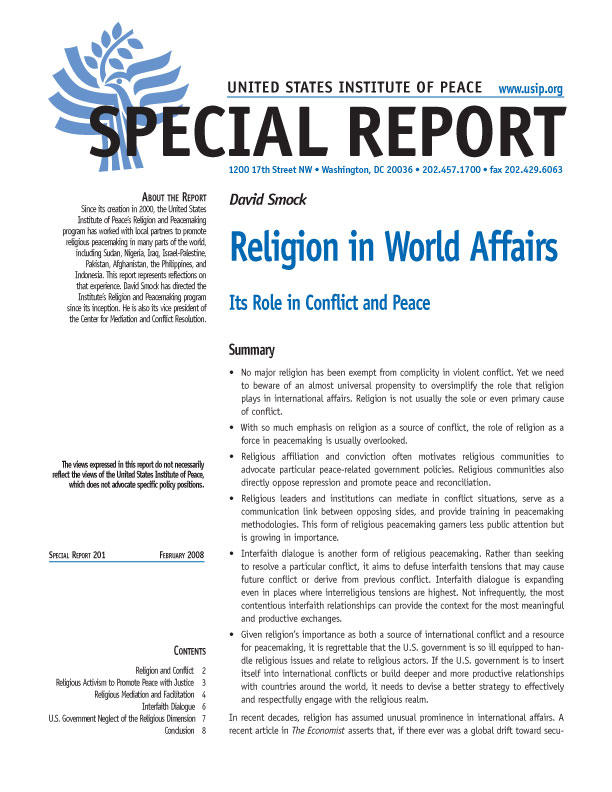Religion in World Affairs: Its Role in Conflict and Peace
In recent decades, religion has assumed unusual prominence in global affairs. The horrendous events of 9/11, the conflagration in Iraq, and the aggressive assertiveness of quasi-theocratic Iran only confirm in the popular mind that religion lies behind much of contemporary international conflic

Summary
- No major religion has been exempt from complicity in violent conflict. Yet we need to beware of an almost universal propensity to oversimplify the role that religion plays in international affairs. Religion is not usually the sole or even primary cause of conflict.
- With so much emphasis on religion as a source of conflict, the role of religion as a force in peacemaking is usually overlooked.
- Religious affiliation and conviction often motivates religious communities to advocate particular peace-related government policies. Religious communities also directly oppose repression and promote peace and reconciliation.
- Religious leaders and institutions can mediate in conflict situations, serve as a communication link between opposing sides, and provide training in peacemaking methodologies. This form of religious peacemaking garners less public attention but is growing in importance.
- Interfaith dialogue is another form of religious peacemaking. Rather than seeking to resolve a particular conflict, it aims to defuse interfaith tensions that may cause future conflict or derive from previous conflict. Interfaith dialogue is expanding even in places where interreligious tensions are highest. Not infrequently, the most contentious interfaith relationships can provide the context for the most meaningful and productive exchanges.
- Given religion’s importance as both a source of international conflict and a resource for peacemaking, it is regrettable that the U.S. government is so ill equipped to handle religious issues and relate to religious actors. If the U.S. government is to insert itself into international conflicts or build deeper and more productive relationships with countries around the world, it needs to devise a better strategy to effectively and respectfully engage with the religious realm.
In recent decades, religion has assumed unusual prominence in international affairs. A recent article in The Economist asserts that, if there ever was a global drift toward secularism, it has been halted and probably reversed. In the article, Philip Jenkins, a noted scholar from Pennsylvania State University, predicts that when historians look back at this century they will see religion as "the prime animating and destructive force in human affairs, guiding attitudes to political liberty and obligation, concepts of nationhood and, of course, conflicts and wars." The article then cites statistics from a public opinion survey in Nigeria demonstrating that Nigerians believe religion to be more central to their identity than nationality. Nigerians are thus more likely to identify themselves first and foremost as Christians or Muslims rather than as Nigerians. The horrendous events of September 11, the conflagration in Iraq, and the aggressive assertiveness of quasi-theocratic Iran only confirm in the popular mind that religion lies behind much of contemporary international conflict.
About the Report
Since its creation in 2000, the United States Institute of Peace’s Religion and Peacemaking program has worked with local partners to promote religious peacemaking in many parts of the world, including Sudan, Nigeria, Iraq, Israel-Palestine, Pakistan, Afghanistan, the Philippines, and Indonesia. This report represents reflections on that experience. David Smock has directed the Institute’s Religion and Peacemaking program since its inception. He is also the vice president of the Center for Mediation and Conflict Resolution.



